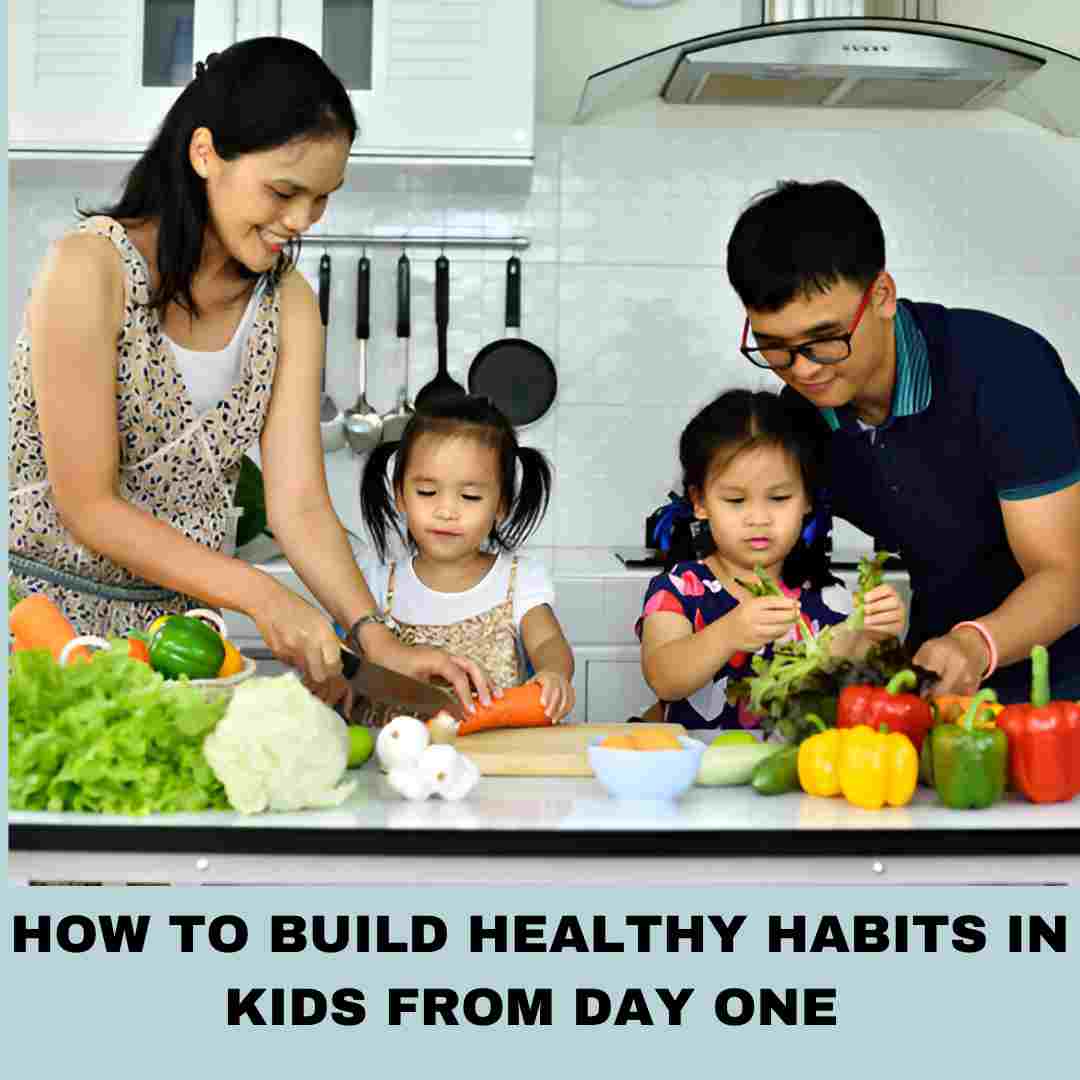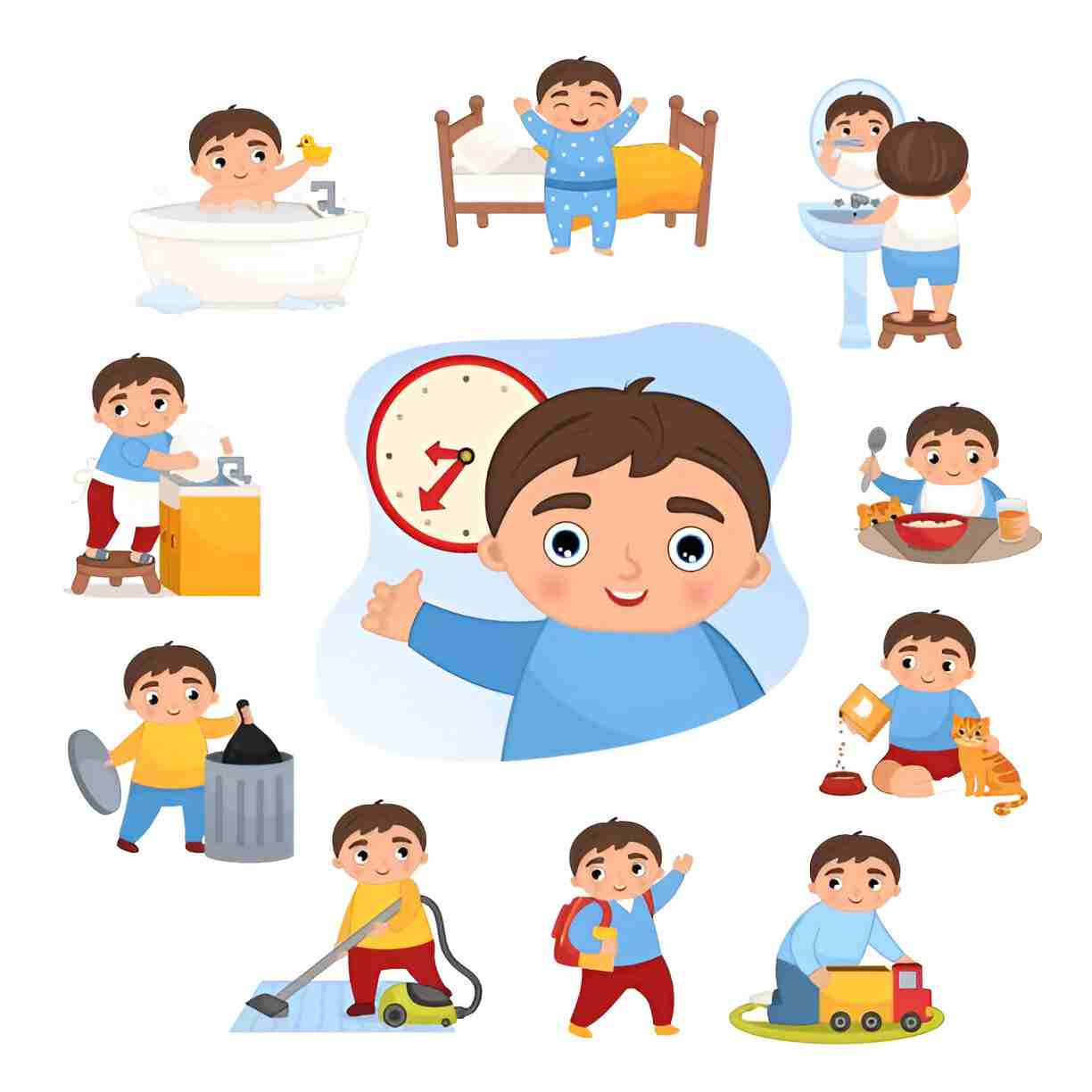How to Build Healthy Habits in Kids From Day One
From the moment your little one takes their first breath, you have a unique opportunity to set the stage for a lifetime of healthy habits. As parents, we often find ourselves bombarded with advice on what to do—and sometimes even more on what not to do.
However, to build healthy habits in kids from day one doesn’t have to be complicated. In fact, it starts with simple, everyday choices that create a foundation for wellness, resilience, and joy.
We’ll discuss how to build healthy habits in kids from day one, covering everything from establishing nutritious routines to encouraging active play and promoting- emotional well-being. By embracing small, intentional steps early on, you’re not just taking care of your child’s physical needs; you’re also nurturing their ability to grow into confident, self-assured individuals.

Importance of Healthy Habits in Kids
Healthy habits are crucial for children as they are the foundation for a lifetime of physical, mental, and emotional well-being.
1. Physical Health
- Growth and Development: Proper nutrition, regular exercise, and adequate sleep support healthy growth and development in children.
- Disease Prevention: Healthy habits like eating balanced diets, staying active, and maintaining good hygiene reduce the risk of childhood obesity, diabetes, and other chronic illnesses.
- Strong Immune System: A nutritious diet and regular physical activity boost the immune system, which can help kids fight off infections and illnesses.
Don’t miss:
2. Mental and Emotional Well-being
- Improved Mood: Physical activity and a balanced diet are linked to better mental health, reducing symptoms of anxiety and depression.
- Stress Management: Healthy habits like mindfulness, adequate sleep, and outdoor play help children manage stress and build resilience.
- Self-Esteem: Feeling good physically and mentally contributes to a positive self-image and confidence.
3. Cognitive Development
- Better Academic Performance: Proper nutrition and sleep improve concentration, memory, and learning abilities, leading to better performance in school.
- Brain Development: Nutrients like omega-3 fatty acids, iron, and vitamins are essential for brain development and cognitive function.
4. Social Skills
- Teamwork and Cooperation: Participating in sports or group activities teaches children teamwork, communication, and cooperation.
- Healthy Relationships: Kids who practice good habits like empathy, kindness, and self-discipline are more likely to build positive relationships with peers and adults.
5. Lifelong Habits
- Prevention of Future Health Issues: Establishing healthy routines early reduces the risk of developing chronic conditions like heart disease, obesity, and hypertension later in life.
6. Energy and Vitality
- Increased Energy Levels: A balanced diet and regular exercise provide children with the energy they need to stay active and engaged in daily activities.
- Better Sleep Quality: Healthy habits like limiting screen time and maintaining a consistent bedtime routine improve sleep quality, which is essential for overall health.
7. Hygiene and Safety
- Prevention of Illnesses: Teaching kids good hygiene habits, such as handwashing and dental care, helps prevent the spread of infections and diseases.
- Safety Awareness: 6 habits like wearing helmets, seat belts, and sunscreen instill a sense of safety and responsibility.
How to Build Healthy Habits in Kids From Day One
1. Lead by Example
Kids often mimic the behavior of adults around them. If they see you practicing healthy habits, they are more likely to adopt them. If you want your child to eat more vegetables, make sure you’re eating them too. During dinner, say, “I love how colorful my plate looks with all these veggies! Let’s try the broccoli together.”

2. Make Healthy Eating Fun
Associating healthy foods with fun and creativity can make kids more willing to try them. Create a “rainbow plate” challenge where your child picks fruits and vegetables of different colors. For instance, strawberries (red), carrots (orange), bananas (yellow), and cucumbers (green). You can also cut fruits into fun shapes using cookie cutters.
3. Incorporate Physical Activity into Daily Life
Regular physical activity helps kids build strength, coordination, and a love for movement. Instead of saying, “Let’s go exercise,” make it playful. Say, “Let’s have a dance party!” or “Who can hop like a bunny to the mailbox?”

4. Establish Consistent Routines
Routines provide structure and help kids feel secure, making it easier for them to adopt healthy habits. Set a bedtime routine that includes brushing teeth, reading a book, and winding down. This becomes a natural part of their lives later on. You can say, “After we brush our teeth, let’s read your favorite story.”
5. Involve Kids in Meal Preparation
When kids help prepare meals, they’re more likely to eat what they’ve made and learn about healthy ingredients. Let your child wash vegetables, stir ingredients, or assemble a salad. Say, “You’re such a great helper! Let’s make a yummy salad with all these fresh veggies.”
6. Teach Proper Hygiene
Encourage regular handwashing, brushing teeth twice a day, and bathing. Make hygiene routines fun with songs, timers, or colorful products.
7. Limit Screen Time and Encourage Outdoor Play
Reducing screen time frees up opportunities for physical activity and creative play. Set a rule like, “We can watch one episode of your favorite show, and then let’s go outside to play.”
8. Teach the Importance of Hydration
Drinking enough water is essential for energy, focus, and overall health. Let your child pick out a fun water bottle and encourage them to drink water throughout the day. You can say, “Let’s see if we can finish our water bottles before lunch!”
9. Educate About Nutrition
Teach kids about the benefits of different foods and how they help their bodies grow and stay strong. Use age-appropriate books, games, or videos to make learning about nutrition engaging.
10. Praise Effort, Not Just Results
Positive reinforcement encourages kids to keep trying, even if they don’t succeed right away. If your child tries a new vegetable, say, “I’m so proud of you for trying something new!” instead of focusing on whether they liked it or not.
11. Educate Through Stories and Games
Kids learn best through stories and play, which can make healthy habits more engaging. Read book about healthy eating or play games, “Guess the Fruit” (describe a few fruit, and they guess what it is). You can also, use apps or videos that teach kids about nutrition in a fun way.
12. Encourage Mindfulness and Emotional Health
Teaching kids to manage stress and emotions helps them develop resilience and self-awareness. Practice deep breathing exercises together. Say, “Let’s take three big breaths to calm our bodies.”
13. Set Realistic Goals and Celebrate Progress
Small, achievable goals help kids build confidence and stay motivated. If your child is learning to eat more fruits, set a goal like, “Let’s try one new fruit this week.” When they achieve it, celebrate with a high-five or a sticker chart.
14. Create a Positive Environment
A supportive and encouraging environment makes it easier for kids to adopt healthy habits. Keep healthy snacks like cut-up fruits and veggies within reach, and limit junk food in the house. Say, “Look at all these tasty snacks we have! Which one do you want?”
15. Teach the “Why” Behind Habits
When kids understand the reasons behind healthy habits, they’re more likely to stick with them. Explain, “Eating carrots helps our eyes see better,” or “Sleeping early helps our bodies grow strong.”
16. Be Patient and Consistent
Habits take time to form, and consistency is key to long-term success. If your child resists brushing their teeth, gently remind them every night and make it a non-negotiable part of the routine.
General healthy habits for kids
1. Healthy Eating Habits
- Eat a balanced diet with fruits, vegetables, whole grains, and proteins.
- Avoid excessive junk food, sugary snacks, and sodas.
- Drink plenty of water throughout the day.
- Practice mindful eating and avoid overeating.
2. Regular Physical Activity
- Engage in at least 60 minutes of physical activity daily (e.g., playing sports, cycling, dancing, or walking).
- Limit screen time and encourage outdoor play.
3. Good Sleep Routine
- Maintain a consistent bedtime and wake-up time.
- Ensure 9-12 hours of sleep per night, depending on age.
- Avoid screens at least an hour before bedtime.
4. Personal Hygiene
- Brush teeth twice a day and floss regularly.
- Wash hands before meals and after using the restroom.
- Bathe or shower daily and keep hair clean.
- Keep nails trimmed and clean.
5. Respect and Kindness
- Treat others with respect, including peers, elders, and teachers.
- Practice empathy and kindness toward others.
- Use polite words like “please,” “thank you,” and “sorry.”
6. Responsibility and Independence
- Complete homework and chores on time.
- Take care of personal belongings and keep their space organized.
- Learn basic life skills like tying shoelaces, packing their bag, or preparing simple meals.
7. Reading and Learning
- Read books regularly to improve vocabulary and knowledge.
- Cultivate curiosity and ask questions about the world.
- Develop a habit of learning something new every day.
8. Time Management
- Follow a daily routine for study, play, and rest.
- Prioritize tasks and avoid procrastination.
- Use a planner or calendar to keep track of assignments and activities.
9. Good Manners
- Practice table manners (e.g., chewing with mouth closed, using utensils properly).
- Listen when others are speaking and wait for their turn to talk.
- Be punctual and respect others’ time.
10. Emotional Regulation
- Express feelings in a healthy way (e.g., talking about emotions instead of throwing tantrums).
- Practice mindfulness or relaxation techniques to manage stress.
- Learn to handle failure and setbacks positively.
11. Financial Awareness
- Save money in a piggy bank or savings account.
- Understand the value of money and avoid unnecessary spending.
- Learn to differentiate between needs and wants.
12. Environmental Responsibility
- Turn off lights and appliances when not in use.
- Recycle and dispose of waste properly.
- Respect nature and avoid littering.
13. Social Skills
- Make friends and interact positively with peers.
- Share and take turns during play.
- Resolve conflicts peacefully and avoid bullying.
14. Gratitude and Positivity
- Practice gratitude by acknowledging the good things in life.
- Maintain a positive attitude and focus on solutions rather than problems.
- Celebrate small achievements and progress.
15. Safety Awareness
- Follow safety rules (e.g., wearing helmets, seat belts, or looking both ways before crossing the street).
- Avoid talking to strangers or sharing personal information online.
- Know emergency contact numbers and basic first aid.
In conclusion, building healthy habits in your child from day one isn’t just about immediate benefits—it lays the groundwork for a lifetime of wellness, resilience, and positive choices. By establishing balanced nutrition, consistent routines, ample physical activity, and a nurturing environment early on, you empower your child to grow into a confident, healthy individual. Remember, every small, mindful action you take today contributes to shaping tomorrow’s habits. Embrace the journey with patience and love, knowing that each step, no matter how small, builds a stronger foundation for your child’s future.


